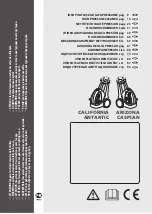
Installation site
The appliance is not intended to be
mounted in a wall or other vertical
surface of a building or cabinet. The
unit is allowed for built-in
application.
,
The machine may
not
be
operated without the lid in place.
,
Do not install the machine
directly next to or over an open floor
drain or drain channel. Moisture can
penetrate the machine and damage
electrical parts.
A concrete floor is the most suitable
surface for the washer. Concrete floors
are less prone to vibration during the
spin cycle than wooden floors.
,
If the machine is installed on a
masonry or concrete base it
must
be secured with retaining clips to
prevent the washer from vibrating off
the stand during the spin cycle.
^
The machine must be leveled and
securely positioned.
^
To avoid vibration while spinning, the
machine should
not be installed
on
soft floor coverings.
In case the installation must be on a
wooden joist floor:
^
Install the unit on a 27
9
/
16
" x 23
5
/
8
" x
1
3
/
16
" (70 x 60 x 3 cm) plywood
base. Ideally the base should be
large enough to span several joists
and should be anchored to the joists
and not just the floor boards.
It is best to install the washer in the
corner of a room, where the stability of
the floor is at its greatest.
Installation
^
Use the front washer feet and the
rear excess end to transport the
washer from its shipping pallet to the
installation site.
Do not lift the washer by the drum
door.
,
Ensure that the machine’s feet
and the floor are dry to prevent
slippage during the spin cycle.
Removing the shipping struts
^
Remove the left and right rotary
protectors.
1
. Unhook the rotary protector with a
screw driver.
2
. Remove the rotary protectors.
Installation
48
















































